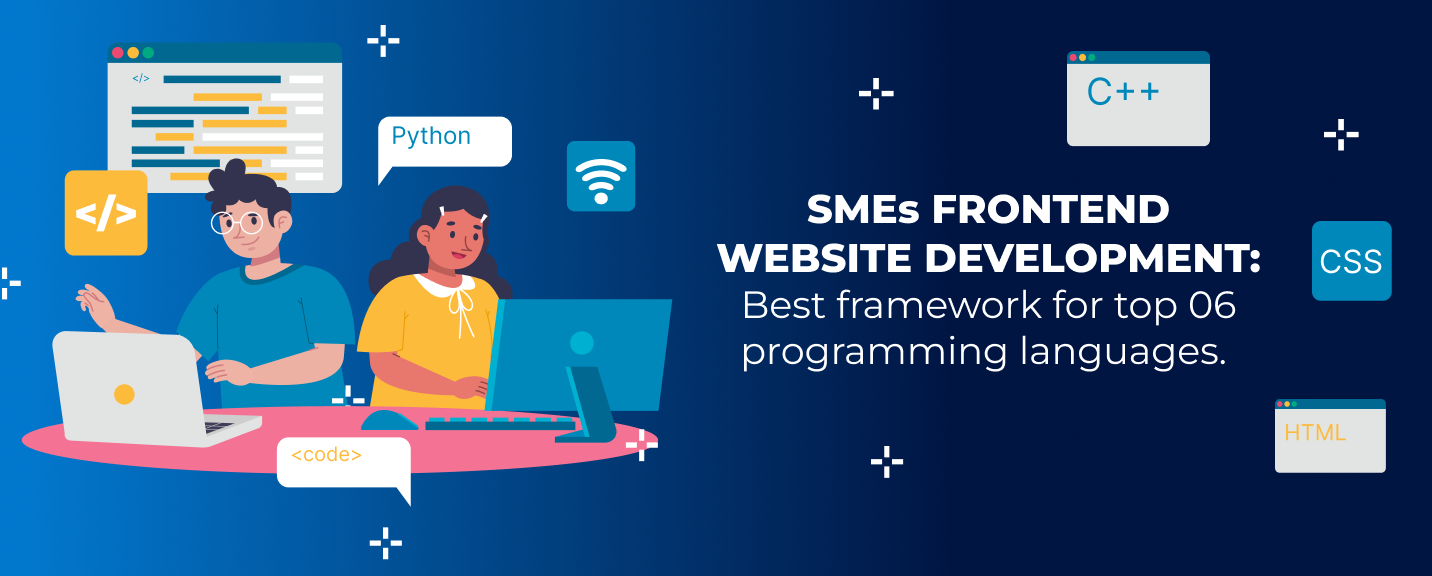TABLE OF CONTENT
Advantages of matching languages and framework in frontend website development
The best frontend frameworks for six popular programming languages.
Conclusion
Advantages of matching languages and framework in frontend website development
Over 250 programming languages are currently in use in software technology…
The first programming language was developed in 1883. Programming languages enable humans to efficiently communicate with machines and order them to perform the necessary functions. It is essential as humans and machines work in distinct ways. Programming is the key to bridging frontend website development to functional web pages.
Browsing through the history of programming language, it is safe to conclude that the creation and development of programming language are close to the development of the world in general. FORTRAN was developed by John Backus from 1957 as a programming language to construct scientific, mathematical, and statistical software. Then, COBOL, LISP, and BASIC were born and widespread for students without a strong background in math and information technology to connect them with computers until 1970. In their early software development stages, Apple promoted Pascal and, next, C and C++. R was introduced in 1993 by Ross Ihaka and Robert Gentleman to perform data analysis. The continual expansion of programming enables some languages to be specialized for specific domains.
Performance and efficiency are two essential factors in frontend website development. To boost performance and efficiency, frontend developers often use frameworks. Proper performance and efficiency can execute code quickly, which is vital for applications that require speed. You can achieve modern, user-driven websites and web applications with these frameworks.
So, what are the world’s top popular programming languages for frontend website development? With our experience as a web development company, we have gathered the best frontend frameworks for six popular programming languages.
Reference: Advantages of website development company
The best frontend frameworks for six popular programming languages.
PHP
Noticed in the list is the language that was born for website application and development. PHP (short for Hypertext Preprocessor) was invented by Rasmus Lerdorf in 1995 to support frontend website development and is widely used today. Leading social networking- Facebook and high-ranked organizations like Harvard University use PHP, making the language even more popular and expanding its territories.
Three most significant advantages of PHP in frontend website development we discover are:
- PHP is open-source and free of cost. It can be downloaded anywhere and is available at any time.
- PHP is platform independent. PHP-based applications can operate on several operating systems, such as UNIX, Linux, and Windows.
- Faster rate of loading over slow internet speed than other programming languages.
In addition, the syntax of PHP is analogous to the programming languages such as C and C++. So, someone familiar with C programming can efficiently work on PHP. If your SME business chooses PHP for frontend website development, the best framework recommended for SMEs is Laravel.
Laravel is a free-of-charge and open-source framework that was released in 2011. Laravel remains in the number 1 position as the most used and fastest PHP framework. For developers, it is clean and elegant with multiple choice of pairing. For a business owner, Laravel encourages the productivity of frontend website development as it serves as a robust backend API for mobile applications and other devices. In 2023-2024, Laravel still proves its strength and growth over other competitors.
Also for reference: Top 10 frameworks for PHP frontend website development

JavaScript
JavaScript (often abbreviated as JS) is the language that took away the crown of Python and C over the years thanks to its groundbreaking technology. It first appeared in 1996; JavaScript is now the core technology of 98.7% of websites for the client perspective of web app behavior.
Please note that although Java and JavaScript share some familiarity in name, syntax, and libraries, they are two distinct languages and, indeed, different in design.
The advantages of JavaScript in frontend website development:
- JavaScript is the most popular language of the World Wide Web, so their libraries and communities are growing steadily with valuable resources and tips.
- Most browsers enable JavaScript, making it easier to comprehend and recognize code. In other words, you can edit a webpage simply by using the browser.
- JavaScript is an Event-Based coding language. This fact means various code segments are run after a user clicks a button.
However, JavaScript also raises concerns about risk of security on the end-user side and the debug function is not supportive for developers and programmers.
JavaScript also has many powerful frameworks that support user activities. To name the most outstanding name for SMEs in recent years, Vue.Js must be the top-of-mind in 2023. Vue.JS features a flexible architecture that focuses on component composition and includes a wide range of libraries designed to be extensible and customizable. Vue will take up tiny space in your memory compared with other frameworks and enables Composition API.

C++
C++, sometimes also known as CPP, is a high-level programming language for frontend website development. C++ is the compiled language that several vendors provide: Microsoft, Intel, Oracle, and IBM. This is also the language that ISO standardized; the latest standard version was announced in December 2017. Many other programming languages for frontend website development were based in C++, including C#, D, Java, and multiple updated versions of C programming language.
Because it is one of the oldest and most efficient languages, C++ has undoubtedly strength over other technologies:
- C++ libraries are built and standardized by experts and scientists.
- C++ program serves both small and large-scale data.
- This language treats data as objects and then allows object-oriented functions such as inheritance, computer science, encapsulation, etc.
On the other hand, C++ is comparatively difficult to understand and consumes large amounts of memory, which also affects the speed of frontend website development.
There are several famous brands for C++ framework of frontend website development as C++ is a versatile and popular language. For SMEs, we would like to emphasize the language’s features of easy application and cost-effectiveness, so we picked out “Qt,” called “cute,” to introduce in this section. It works across various software and hardware platforms and performs as a frontend website development framework. Qt does not require changing the underlying code base but runs with optimized speed.
Python
Python is becoming a steamy topic across self-study programming threads only, following the rising era of Machine learning and Artificial Intelligence. However, Python was born in the late 1980s and continually ranked as one of the most popular languages for multi-purposes, consisting of frontend website development. It supports aspect-oriented programming and has the philosophy to be beautiful, explicit, simple, complex, and readable.
- Python is the minimalist in the “family” of programming languages for frontend website development because it is more superficial and structural in syntax and grammar.
- It is easier to understand, more like a friendly transcription into another language.
- Python also has a free and open-source license.
Some of the other downsize of Python is the worry of slow speed and heavy memory usage. Pyramid, a frontend website development framework, is one of the ways to decrease this weakness of Python. Pyramid has a robust codebase and is comparable in several environments. It suits SMEs as Pyramid has a scalable feature and provides a wide range of options compared to other website frameworks. In conclusion, the Pyramid helps you start small and end with greatness.

HTML
HTML is short for Hypertext Markup Language, born to structure and decorate webpage applications, and only for frontend website development. One of the most extensive features of HTML is that all worldwide browsers support it, such as Google Chrome, Safari, Firefox, and Opera. So, frontend website development using HTML gives developers an easy way to optimize and control.
Despite HTML’s most significant advantages, it alone cannot support a visually appealing front page and only allows primary graphic effects. React framework, which supports both frontend and backend, is best suited for HTML and any other backend technology it compiles. Companies that favor React Framework for frontend website development lists are Dropbox, Instagram, Airbnb, Walmart, Pinterest, and Discord.
CSS
CSS or Cascading Style Sheets, the language makes the website elegant and optimizes for user experience. Developers use CSS to style an HTML code for frontend website development. In other words, CSS decides how an HTML webpage is displayed in front of the screen. This language is easy to learn, consistent, and convenient.
On the other side, one disadvantage of CSS is that it contains many levels, which is complicated for a beginner’s management level. Different browsers make CSS work differently, so developers must adapt the implementation among each.
There are three ways to use CSS to support frontend website development: (1) external CSS, (2) internal CSS, and (3) inline CSS. Some of the popular and easy CSS text editors for SMEs are:
- Subline Text
- Notepad++
- Atom
- Stylizer
- Espresso
- Brackets
Conclusion
It may need clarification for SMEs who want to optimize and hire frontend website development in 2023. Many technologies, such as programming languages and frameworks, to decide. So, like many customers, we have advised finding a consulting partner to ensure your website system is one of the best solutions. Simplify the world of frontend website development so your business can leverage digital transformation in the best ways: saving cost, high return, and clean delivery. AHT Tech is a young and dynamic technology ITO in Vietnam with more than 15 years of experience in website development for SMEs and Start-ups.
Leave your request for frontend development website.



